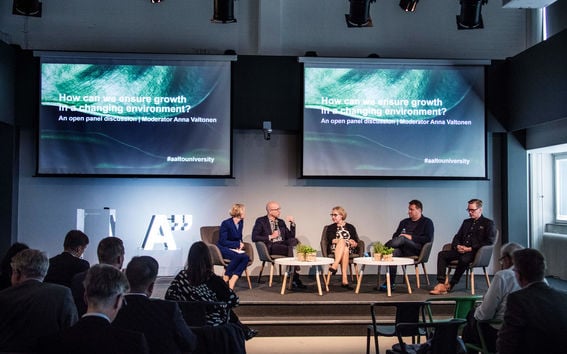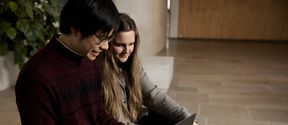A village chief calls for responsible innovation, and an urban economics expert for tight-knit urban development

What is required for growth in a rapidly changing world where global challenges are strongly present? What capacities and competences are needed in business, and what is the role of the university? These issues were discussed at the Aalto Vision Forum on 22 May together with Aalto donors and partners.
In his contribution to the discussion, Jussi Herlin, Member of the Board of Directors of KONE, stressed that the solving of major global challenges requires extensive cooperation.
‘The world in which we operate is unstable and fragile. It has its limits, which means that our growth also has limits. As a father, I feel strongly that our job is to make the world a better place. The faster we act, the faster we can make the bold decisions required by investments and growth.’
Global challenges are also opportunities for growth, as they force us to innovate new solutions that support sustainable development. Dean of Aalto University School of Chemical Engineering Kristiina Kruus highlighted recycling and the innovation of environmentally friendly materials, particularly Ioncell, as a good example.
‘Approximately seven per cent of Finnish people's carbon footprint is caused by textiles. We can significantly reduce our carbon footprint by investing in the recycling of materials and introducing replacement fibres for cotton.’

The generation of new solutions requires an innovative culture, the creation of which often demands major changes, particularly in traditional organisations. According to Village Chief Mikko Kauppinen from Health Innovation Village at GE, basic elements in the recipe for change include the creation of an atmosphere of openness and cooperation, and transition to an agile and rapid work culture characterised by bold experimentation and learning together.
‘Business models are now changing faster than technology. Everyone in the company is responsible for generating innovations. This requires openness and courage to experiment. Because the change is ongoing, we need to continuously learn how to control the chaos. Everything is running smoothly when there is a controlled chaos.’
Professor of Urban Economics Tuukka Saarimaa called for more tight-knit urban development and more efficient land use.
‘Compared to many western countries, Finland is still lagging behind in urbanisation. From the perspective of productivity and growth, it is important to understand how we can take advantage of the positive effects of urbanisation and ensure that the benefits are higher than the cost of urban growth.’
In terms of ensuring growth, support for lifelong learning and the promotion of multidisciplinary cooperation were seen as important tasks of the university.
‘On the European scale, the Aalto campus is a unique centre of cooperation combining science, art, technology and economy. It produces changemakers that are used to solving challenges and creating together. It is a cradle of student-oriented entrepreneurship almost unrivalled in the world. Cooperative partners and all the support we have received from our donors, alumni, companies, foundations and other organisations are also of great importance to Aalto's innovation ecosystem’, says President of Aalto University Ilkka Niemelä.
Further information on the Aalto Vision Forum:
Head of Donor Engagement Sinikka Heikkala
tel. +358 40 090 8899
[email protected]
- Published:
- Updated:
Read more news

The City of Espoo and Aalto University signed a strategic agreement for a new five-year partnership period
The collaboration includes investments in the Otaniemi area, business and innovation activities, and efforts to integrate international talent.Talent Boost Strategy Project at Aalto in 2021-2024
This article takes a look at the achievements of the Talent Boost project at Aalto.
14 projects selected for seed funding to boost collaboration between Aalto, KU Leuven, and University of Helsinki
The funded projects lay the groundwork for future joint research endeavors, reinforcing the strategic partnership’s goal to fostering impactful and interdisciplinary collaboration.